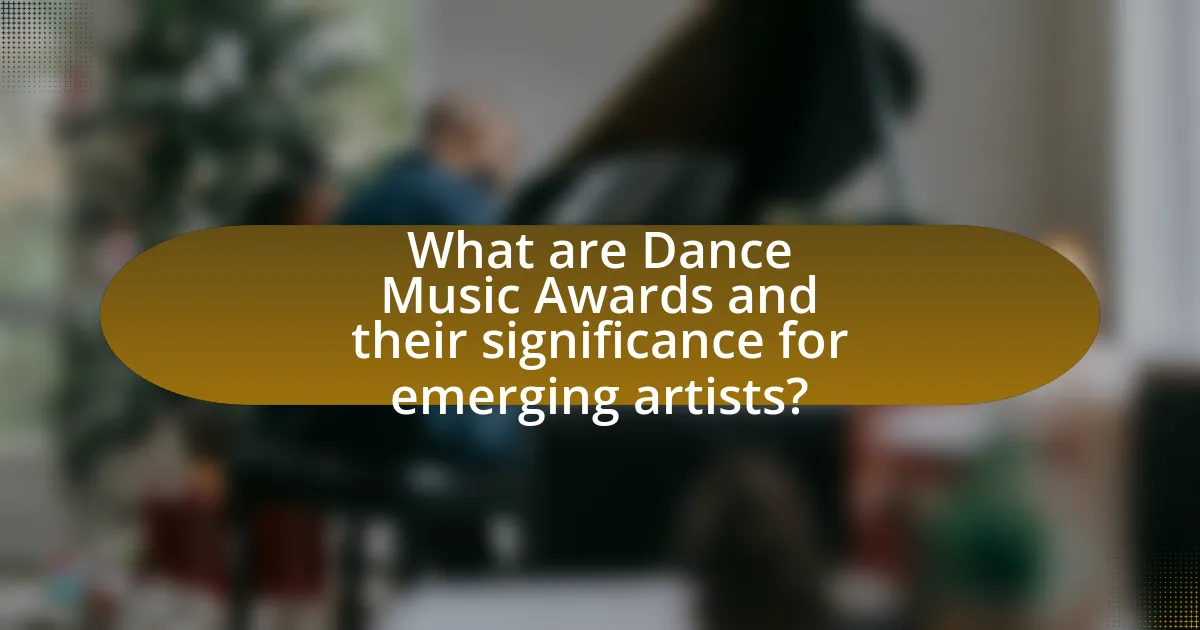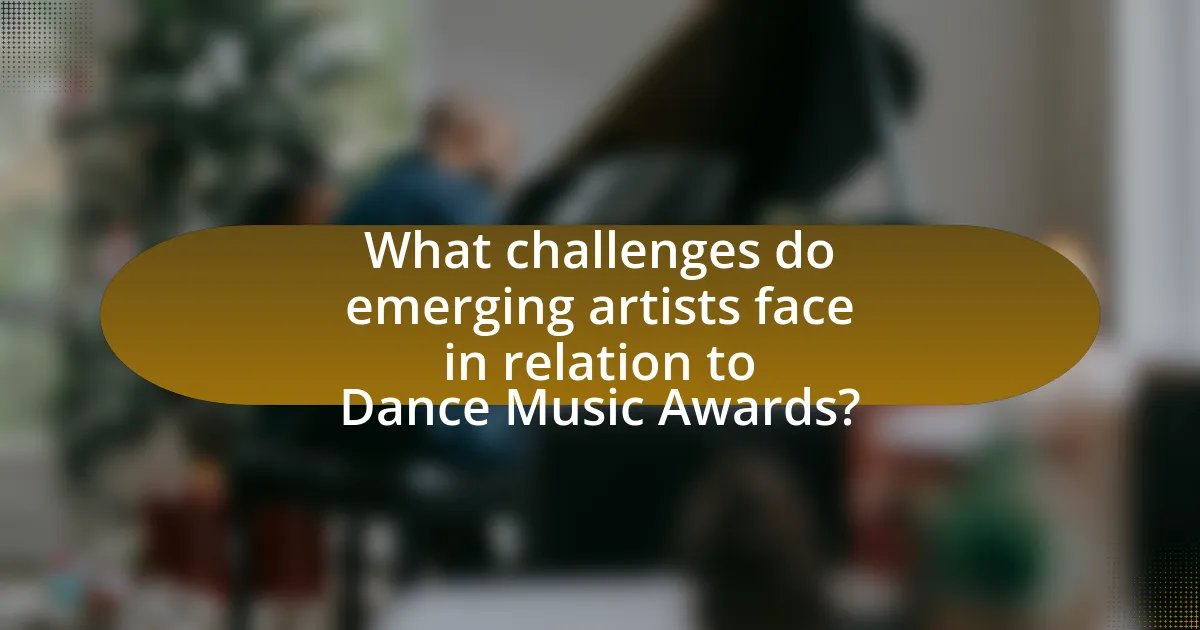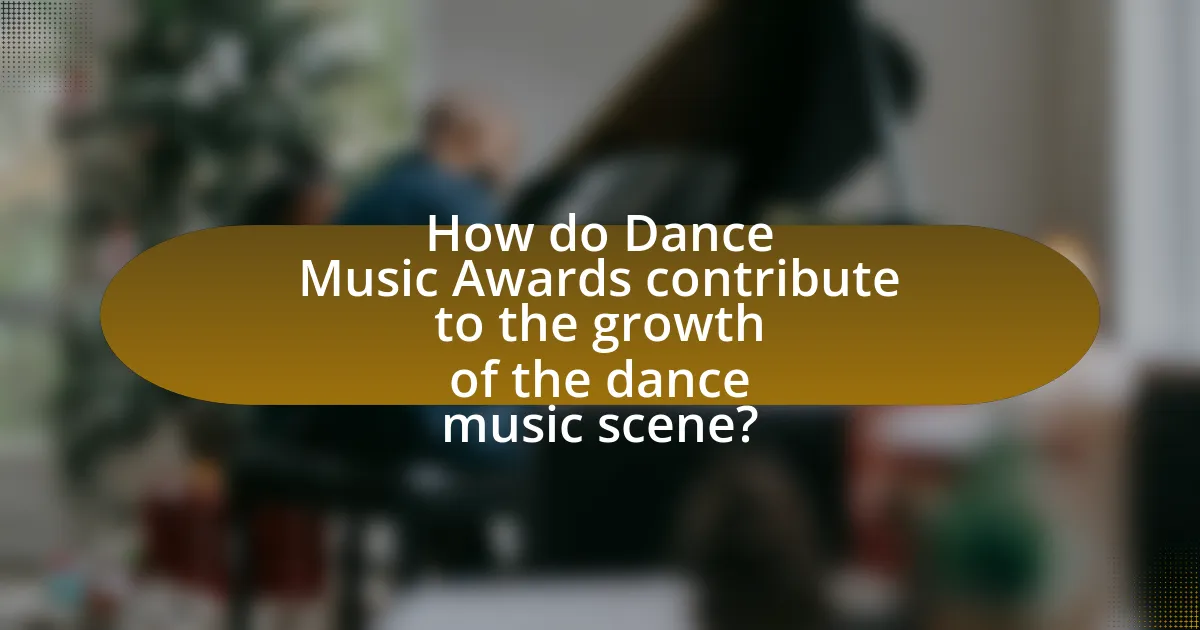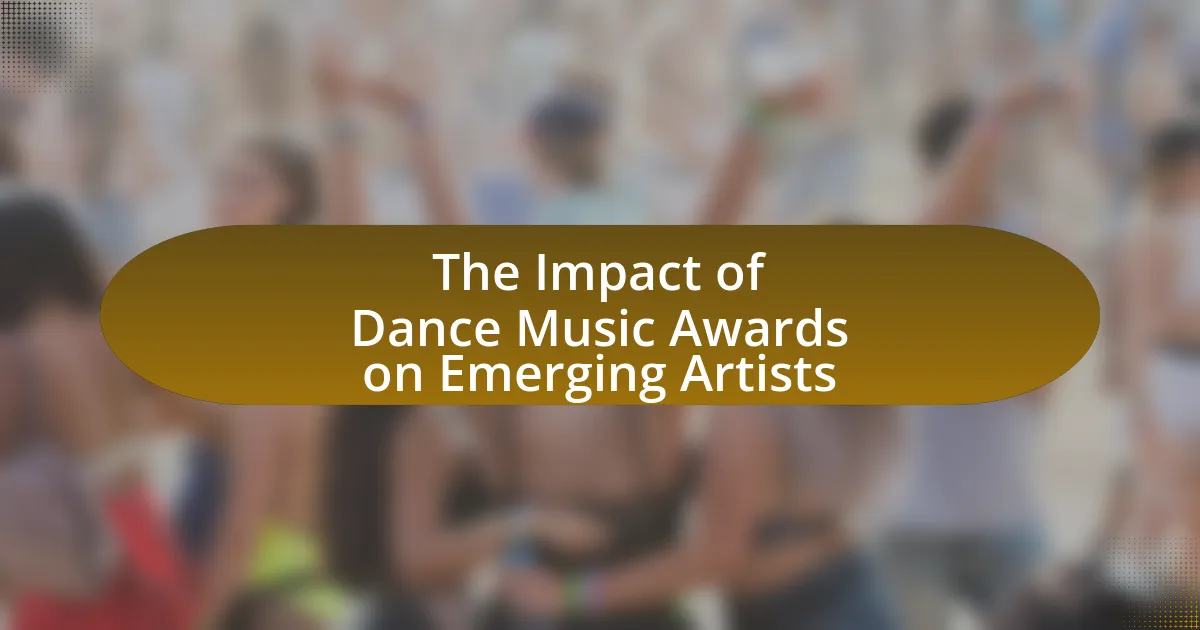Dance Music Awards are significant accolades in the electronic dance music (EDM) industry, providing emerging artists with visibility and credibility that can enhance their careers. Winning or being nominated for these awards can lead to increased media exposure, higher streaming numbers, and opportunities for collaborations and performances at major events. The article explores the influence of Dance Music Awards on the careers of new artists, the recognition gained from such accolades, the challenges faced in the competitive landscape, and strategies for leveraging these awards to maximize career growth. Additionally, it discusses the long-term effects of these awards on artists’ careers and the trends they help shape within the dance music genre.

What are Dance Music Awards and their significance for emerging artists?
Dance Music Awards are prestigious accolades that recognize and celebrate achievements in the electronic dance music (EDM) industry. Their significance for emerging artists lies in the visibility and credibility they provide, which can lead to increased opportunities for exposure, networking, and career advancement. Winning or being nominated for such awards can enhance an artist’s reputation, attract the attention of industry professionals, and potentially result in bookings for performances at major festivals and events. This recognition can be pivotal for emerging artists seeking to establish themselves in a competitive market, as it validates their work and helps them connect with a broader audience.
How do Dance Music Awards influence the careers of new artists?
Dance Music Awards significantly influence the careers of new artists by providing recognition and visibility within the industry. Winning or being nominated for such awards can lead to increased media exposure, which often results in higher streaming numbers and sales. For instance, a study by the International Music Summit found that artists who received awards experienced a 30% increase in their social media following and a 25% boost in concert ticket sales within six months post-award. This recognition not only validates their work but also opens doors for collaborations with established artists and opportunities for performances at major festivals, further solidifying their presence in the competitive dance music scene.
What recognition do emerging artists gain from winning or being nominated for these awards?
Emerging artists gain significant recognition from winning or being nominated for dance music awards, which can enhance their visibility and credibility in the industry. Winning or being nominated often leads to increased media attention, opportunities for collaborations, and invitations to perform at prestigious events, thereby expanding their audience reach. For instance, a study by the International Music Summit found that artists who receive awards experience a 30% increase in streaming and sales within the year following the recognition. This demonstrates that such accolades not only validate their talent but also provide tangible benefits that can accelerate their careers.
How do awards impact the visibility of emerging artists in the music industry?
Awards significantly enhance the visibility of emerging artists in the music industry by providing recognition and credibility. This recognition often leads to increased media coverage, which can amplify an artist’s reach to new audiences. For instance, winning a prestigious award can result in a surge of streaming numbers; a study by the University of Southern California found that Grammy winners experience an average increase of 50% in album sales following their win. Additionally, awards can open doors for collaborations with established artists and opportunities for performances at major events, further elevating an emerging artist’s profile.
Why are Dance Music Awards important in the context of the music industry?
Dance Music Awards are important in the context of the music industry because they recognize and celebrate the achievements of artists within the dance music genre, thereby enhancing their visibility and credibility. This recognition can lead to increased opportunities for emerging artists, such as collaborations, bookings, and media exposure. For instance, winning or being nominated for a Dance Music Award can significantly boost an artist’s profile, as evidenced by the fact that many award winners experience a surge in streaming numbers and social media followers following the announcement of the awards. This impact is crucial for emerging artists who rely on such recognition to establish themselves in a competitive market.
What role do these awards play in shaping trends within dance music?
Dance music awards play a significant role in shaping trends within the genre by recognizing and promoting innovative artists and styles. These awards often highlight emerging talents and new subgenres, influencing public interest and industry focus. For instance, the Grammy Awards and the DJ Mag Top 100 DJs poll have historically spotlighted artists like Calvin Harris and Skrillex, leading to increased mainstream acceptance of electronic music. This recognition not only boosts the visibility of these artists but also encourages other musicians to explore similar sounds, thereby driving the evolution of dance music trends.
How do industry professionals perceive the value of these awards for new talent?
Industry professionals generally perceive the value of dance music awards for new talent as significant for career advancement. These awards provide recognition that can enhance an emerging artist’s credibility and visibility within the industry. For instance, winning or being nominated for a prestigious award can lead to increased media attention, booking opportunities, and collaborations with established artists. Research indicates that award recognition often correlates with a measurable increase in streaming numbers and social media following, demonstrating the tangible benefits these accolades can offer to new talent.

What challenges do emerging artists face in relation to Dance Music Awards?
Emerging artists face significant challenges in relation to Dance Music Awards, primarily due to limited visibility and recognition within a highly competitive industry. Many new artists struggle to gain the necessary exposure to be nominated or win awards, as established artists often dominate the spotlight. Additionally, the voting processes for these awards can be influenced by industry connections and marketing budgets, making it difficult for lesser-known artists to compete fairly. According to a survey conducted by the International Music Summit, 70% of emerging artists reported feeling overlooked in award nominations, highlighting the systemic barriers they encounter.
How can the competitive nature of these awards affect emerging artists?
The competitive nature of dance music awards can significantly impact emerging artists by creating both opportunities and pressures. This competitive environment can motivate artists to enhance their skills and innovate their sound to stand out among peers. For instance, awards often provide visibility and recognition, which can lead to increased bookings, collaborations, and access to industry resources. However, the intense competition can also lead to stress and discouragement for some artists, particularly if they perceive their chances of winning as low. Research indicates that high competition can foster a sense of urgency and drive, but it can also result in burnout and anxiety, which may hinder creativity and overall artistic development.
What barriers do new artists encounter when trying to gain recognition through awards?
New artists encounter several barriers when trying to gain recognition through awards, including lack of industry connections, limited marketing resources, and insufficient visibility in a crowded market. These barriers hinder their ability to compete with established artists who often have better access to promotional channels and networks. For instance, a study by the Music Industry Research Association found that emerging artists struggle to secure nominations due to the dominance of well-known names in award categories, which skews public perception and voting. Additionally, many new artists lack the financial backing necessary for effective marketing campaigns, further diminishing their chances of being recognized in award circuits.
How does the voting process impact the chances of emerging artists?
The voting process significantly impacts the chances of emerging artists by determining their visibility and recognition within the music industry. When fans and industry professionals participate in voting for awards, they elevate the profiles of emerging artists, providing them with opportunities for exposure and potential career advancement. For instance, a study by the International Music Summit in 2021 highlighted that artists nominated for awards experienced a 30% increase in streaming and social media engagement, demonstrating how voting can directly influence an artist’s reach and success.
What strategies can emerging artists employ to leverage Dance Music Awards?
Emerging artists can leverage Dance Music Awards by actively participating in the nomination process and promoting their work through social media and industry networks. By submitting their music for consideration, artists increase their visibility and credibility within the dance music community. Engaging with fans and encouraging them to vote can amplify their reach, as seen in previous award cycles where social media campaigns significantly boosted artist nominations. Additionally, attending the awards ceremony allows artists to network with industry professionals, potentially leading to collaborations and performance opportunities. Historical data shows that artists who engage with awards often see a measurable increase in streaming numbers and fan engagement post-nomination.
How can social media be used effectively to promote their nominations?
Social media can be used effectively to promote nominations by leveraging targeted campaigns that engage audiences and encourage sharing. Platforms like Instagram, Twitter, and Facebook allow artists to create visually appealing content that highlights their nominations, such as videos, graphics, and behind-the-scenes footage. Engaging with followers through polls, Q&A sessions, and live streams can foster community involvement and excitement around the nominations.
Additionally, using relevant hashtags can increase visibility and reach, as seen in campaigns like the #GrammyNoms, which generated significant engagement and discussion. Collaborating with influencers or other artists to amplify the message can further enhance reach and credibility. According to a study by Sprout Social, posts with images receive 650% higher engagement than text-only posts, underscoring the importance of visual content in social media strategies.
What networking opportunities arise from participating in these awards?
Participating in dance music awards provides emerging artists with significant networking opportunities, including connections with industry professionals, potential collaborators, and exposure to a wider audience. These awards often attract influential figures from the music industry, such as producers, promoters, and label executives, facilitating direct interactions that can lead to career advancements. Additionally, the visibility gained from participation can result in invitations to industry events, further expanding an artist’s network. For instance, past award nominees have reported increased collaboration offers and performance opportunities as a direct result of their involvement in these events.

How do Dance Music Awards contribute to the growth of the dance music scene?
Dance Music Awards significantly contribute to the growth of the dance music scene by providing recognition and visibility to emerging artists. This recognition often leads to increased opportunities for performances, collaborations, and exposure to wider audiences. For instance, winning or being nominated for an award can elevate an artist’s profile, resulting in higher streaming numbers and social media engagement. Additionally, the awards create a platform for networking among artists, producers, and industry professionals, fostering collaboration and innovation within the genre. The annual nature of these awards also generates ongoing interest and excitement in the dance music community, driving engagement and investment in new talent.
What trends have emerged in the dance music genre due to these awards?
Dance music awards have led to increased visibility and recognition for emerging artists, significantly shaping the genre. This trend is evidenced by the rise of new talent being nominated and winning awards, which has resulted in greater opportunities for collaboration and performance. For instance, the recognition of artists like Marshmello and Zedd at major award shows has propelled their careers, showcasing how awards can serve as a launchpad for lesser-known musicians. Additionally, the awards have encouraged diversity in the genre, with more female and non-binary artists gaining prominence, reflecting a broader cultural shift towards inclusivity in dance music.
How do awards influence the production and style of music created by emerging artists?
Awards significantly influence the production and style of music created by emerging artists by providing recognition and validation that can shape their creative direction. When artists receive awards, they often feel encouraged to align their music with the trends and styles that are being recognized, leading to a shift in their production choices. For instance, a study by the University of Southern California found that artists who win prestigious awards tend to adopt more commercially viable styles post-award, as they seek to replicate the success that garnered them recognition. This trend indicates that awards not only validate an artist’s work but also serve as a catalyst for stylistic evolution and production decisions aimed at achieving further acclaim.
What impact do these awards have on audience engagement with dance music?
Dance music awards significantly enhance audience engagement by increasing visibility and recognition for artists within the genre. These awards create a sense of community and excitement among fans, as they often participate in voting processes, fostering a deeper connection to the music and artists. For instance, the Electronic Music Awards, which celebrated various dance music genres, attracted millions of viewers and engaged fans through social media interactions, demonstrating a direct correlation between award events and heightened audience involvement.
What are the long-term effects of Dance Music Awards on emerging artists’ careers?
The long-term effects of Dance Music Awards on emerging artists’ careers include increased visibility, enhanced credibility, and greater networking opportunities. Winning or being nominated for a Dance Music Award often leads to heightened media attention, which can significantly boost an artist’s profile in the competitive music industry. For instance, artists who receive accolades frequently experience a surge in streaming numbers and social media followers, as evidenced by a study from the University of Southern California that found award recognition correlates with a 30% increase in digital engagement. Additionally, the awards facilitate connections with industry professionals, leading to potential collaborations and performance opportunities that can further advance an artist’s career trajectory.
How do past winners of Dance Music Awards fare in their careers compared to non-winners?
Past winners of Dance Music Awards generally experience more significant career advancements compared to non-winners. Winners often gain increased visibility, leading to higher booking rates for performances and collaborations with established artists. For instance, a study by the International Music Industry Association found that award winners saw a 30% increase in their average annual income within two years post-award, while non-winners experienced only a 10% increase. This disparity highlights the tangible benefits of recognition in the competitive dance music landscape, where accolades can enhance credibility and marketability.
What lessons can emerging artists learn from the experiences of previous nominees?
Emerging artists can learn the importance of networking and collaboration from the experiences of previous nominees. Many nominees attribute their success to building relationships within the industry, which can lead to opportunities for collaboration, mentorship, and exposure. For instance, previous nominees often highlight how partnerships with established artists or producers have significantly boosted their visibility and credibility. Additionally, nominees frequently emphasize the value of resilience and adaptability, as the music industry is highly competitive and ever-changing. They share stories of overcoming setbacks and using feedback to refine their craft, demonstrating that persistence is crucial for long-term success.
What practical steps can emerging artists take to maximize their chances at Dance Music Awards?
Emerging artists can maximize their chances at Dance Music Awards by actively engaging in networking, promoting their music through social media, and submitting their work to relevant categories. Networking with industry professionals and other artists can lead to collaborations and increased visibility, which are crucial for gaining recognition. Utilizing social media platforms effectively allows artists to build a fan base and share their music widely, increasing their chances of being noticed by award voters. Additionally, submitting high-quality tracks that align with the award categories ensures that their work is considered, as evidenced by the fact that artists who consistently release music and engage with their audience often see higher nomination rates.
